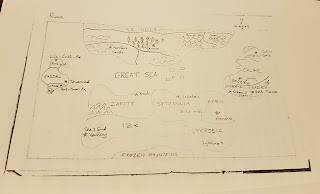Alpha: It's about the Journey
Alpha: It's about the Journey by Rebecca Seaton
I’m still enjoying helping with an Alpha course. It reminds me of
the importance of the journey. It’s about the walk with God and a reminder to
embrace the stages of that relationship not just an end goal of becoming a
Christian or a mature Christian (let me know when you’re there!). It’s the same
with testimonies. Yes, we’re excited about what we see God doing but that can’t
just be about the ‘win’. We like to see success but it’s the process that
intrigues us.
What excites me about Alpha
is change – of course when people meet with God, but it’s the steps along the
way which are just as exciting: seeing people come out of their comfort zone,
asking questions, being increasingly open with each other, etc.
What does
this mean for writing? I’ve already written about The Writer’s Journey (I’m not
on commission, honest) and many of you saw Paul Kerensa’s brilliant take on the
different organisational models for writing at the last ACW day. Suffice to
say, the stages are all important. I’ll just try tackling some obvious ones
here.
Beginnings. We want to know where the main character is at. What do
they lack, what obstacles do they face? We won’t care much about their triumph
later if we don’t appreciate what they had to surmount.
The Middle. How does your character deal with life when things get
sticky? Why didn’t I walk away midway through my first Alpha? There’s a point
when it becomes not just someone telling you about God but a challenge as to
what you yourself think. We learn most about our characters when we see them
challenged, whatever their response.
End. Obviously, this should complete things. But make sure that’s
in terms of character and story. Yes,
the ring’s been destroyed, the bad guy discovered but are your characters also
changed? Has the resilience they found in the middle become something they’ll
always carry with them? Can they look back and see how far they’ve come?
A convincing story is a journey through different stages. When we
look back on significant changes in our lives, the events where we see God’s hand
at work and our own development grow are often the ones where we see not an
explosion but a thread, like a shimmering silk running in and out of a
tapestry. At times it appears to vanish, at others it glitters amongst the darker
hues. But its glory when we see the completed work is much more for seeing how
the tentative thread makes its way across the whole piece.
Rebecca Seaton mostly writes fantasy but has also
been known to dabble in magazine articles and playscripts. Her second novel, A
Prophet’s Grace, is currently with her beta readers.
#amwriting #amwritingfantasy #ACW




I have a large tile on my kitchen table that says 'it's the journey and not the destination that really matters.' I have to constantly remind myself of this and your post sums it up beautifully. And of course this is also true for our characters. Thank you, Rebecca. X
ReplyDeleteHelpful words - thank you
ReplyDeleteHelpful words - thank you
ReplyDeleteI love this, Rebecca. Yes, agree that Paul's take on it was helpful, and so is this. Beginning, middle and end. Everyone talks about it but you disseminate it so clearly.
ReplyDeleteIt's great advice, to make sure that characters undergo some change. It's a really good way to assess whether or not you've fleshed a character out fully during the story.
ReplyDeleteAha - but some people never change - not deeply and fundamentally... do we have characters like this, as well? The person who returns to the tale after a gap, and we find, as the other characters do, that he is still the same old trickster? Just a thought!
ReplyDeleteThank you. Interesting thoughts. But the destination, the testimony, the outcome - this does matter too, in fiction as in life - to me anyway.
ReplyDelete